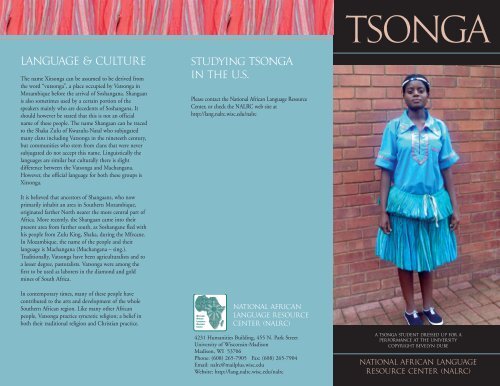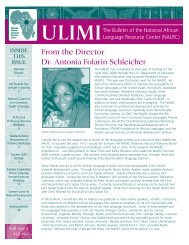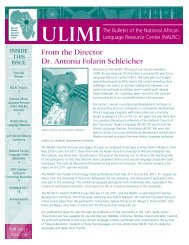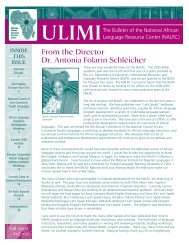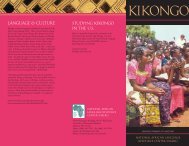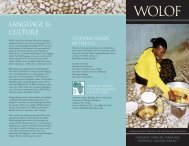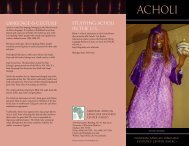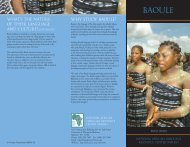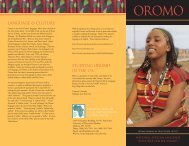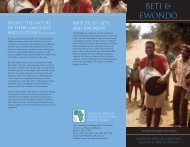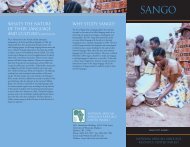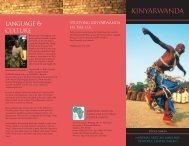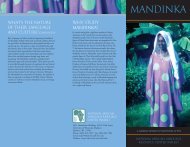TSONGA - National African Language Resource Center
TSONGA - National African Language Resource Center
TSONGA - National African Language Resource Center
You also want an ePaper? Increase the reach of your titles
YUMPU automatically turns print PDFs into web optimized ePapers that Google loves.
<strong>TSONGA</strong><br />
<strong>Language</strong> & Culture<br />
The name Xitsonga can be assumed to be derived from<br />
the word “vutsonga”, a place occupied by Vatsonga in<br />
Mozambique before the arrival of Soshangana. Shangaan<br />
is also sometimes used by a certain portion of the<br />
speakers mainly who are decedents of Soshangana. It<br />
should however be stated that this is not an official<br />
name of these people. The name Shangaan can be traced<br />
to the Shaka Zulu of Kwazulu-Natal who subjugated<br />
many clans including Vatsonga in the nineteeth century,<br />
but communities who stem from clans that were never<br />
subjugated do not accept this name. Linguistically the<br />
languages are similar but culturally there is slight<br />
difference between the Vatsonga and Machangana.<br />
However, the official language for both these groups is<br />
Xitsonga.<br />
Studying <strong>TSONGA</strong><br />
in the U.S.<br />
Please contact the <strong>National</strong> <strong>African</strong> <strong>Language</strong> <strong>Resource</strong><br />
<strong>Center</strong>, or check the NALRC web site at<br />
http://lang.nalrc.wisc.edu/nalrc<br />
It is believed that ancestors of Shangaans, who now<br />
primarily inhabit an area in Southern Mozambique,<br />
originated farther North nearer the more central part of<br />
Africa. More recently, the Shangaan came into their<br />
present area from further south, as Soshangane fled with<br />
his people from Zulu King, Shaka, during the Mfecane.<br />
In Mozambique, the name of the people and their<br />
language is Machangana (Muchangana – sing.).<br />
Traditionally, Vatsonga have been agriculturalists and to<br />
a lesser degree, pastoralists. Vatsonga were among the<br />
first to be used as laborers in the diamond and gold<br />
mines of South Africa.<br />
In contemporary times, many of these people have<br />
contributed to the arts and development of the whole<br />
Southern <strong>African</strong> region. Like many other <strong>African</strong><br />
people, Vatsonga practice syncretic religion; a belief in<br />
both their traditional religion and Christian practice.<br />
<strong>National</strong> <strong>African</strong><br />
<strong>Language</strong> <strong>Resource</strong><br />
<strong>Center</strong> (NALRC)<br />
4231 Humanities Building, 455 N. Park Street<br />
University of Wisconsin-Madison<br />
Madison, WI 53706<br />
Phone: (608) 265-7905 Fax: (608) 265-7904<br />
Email: nalrc@mailplus.wisc.edu<br />
Website: http://lang.nalrc.wisc.edu/nalrc<br />
A <strong>TSONGA</strong> STUDENT DRESSED UP FOR A<br />
PERFORMANCE AT THE UNIVERSITY<br />
COPYRIGHT BEVELYN DUBE<br />
<strong>National</strong> <strong>African</strong> <strong>Language</strong><br />
<strong>Resource</strong> <strong>Center</strong> (NALRC)
Why Study <strong>TSONGA</strong><br />
Tsonga, or Xitsonga belong to the Bantu branch of the<br />
Niger-Congo languages. Designated as one of the 11<br />
official languages of South Africa since 1996 (Act 108<br />
of 1996). Xitsonga is officially at par with other major<br />
South <strong>African</strong> languages such as Isizulu, Isixhosa,<br />
Afrikaans, Tshivenda, Isindebele, Sesotho sa leboa,<br />
Isiswati, Setswana, Southern Sotho and English.<br />
Xitsonga draws its uniqueness from the fact that it is<br />
used by sections of people in South Africa, Swaziland,<br />
Zambia, Mozambique, and Zimbabwe. Knowledge of<br />
this language opens many opportunities across the<br />
Southern region given the language’s transnational<br />
character.<br />
Xitsonga is the spoken language of nearly 2 million<br />
people in South Africa, some 1.5 million in<br />
Mozambique, over 100 000 in Zimbabwe and a few<br />
thousands in Swaziland and Zambia.<br />
Students and scholars of History and the Social<br />
Sciences will also find it rewarding to learn Xitsonga<br />
because like any other <strong>African</strong> language spoken in<br />
South Africa, it spreads across the Southern <strong>African</strong><br />
region tied to the great Mfecane that shaped the<br />
region’s demographics.<br />
Who Speaks <strong>TSONGA</strong><br />
According to Xitsonga linguists, Xitsonga is an allinclusive<br />
name for the Tshwa-Ronga or Tonga Group of<br />
Bantu languages. These dialects or languages are spoken<br />
in South Africa and parts of Southern Mozambique,<br />
Swaziland, Zambia and Southern Zimbabwe. Most of<br />
the Xitsonga dialects are mutually intelligible and the<br />
three major ones are Xirhonga, which is spoken in the<br />
Gaza province of Mozambique with smaller<br />
concentrations in Inhambane, Maputo, Manica and<br />
Sofala. Xitshwa/Chihlengwe is spoken in Zimbabwe and<br />
in Mozambique; Xitsonga is spoken in South Africa. In<br />
South Africa, Xitsonga is spoken mainly in Limpopo<br />
province where speakers are populated in the former<br />
Gazankulu homeland and Gauteng province. In South<br />
Africa this language is a language of secondary<br />
education, public broadcasting and other public media.<br />
Shangaan women in traditional dress<br />
Selling wares at an open market<br />
Tsonga students in Grahamstown, South Africa<br />
Copyright Bevelyn Dube


